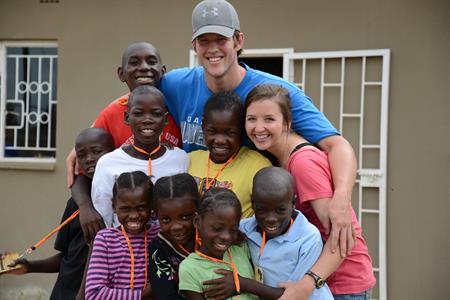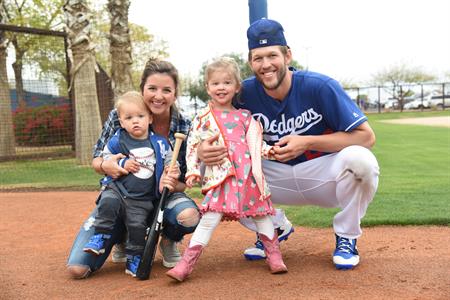This story appears in FCA Magazine’s July/August 2018 issue.
Clayton Kershaw is forever mindful of his time. If the block set aside for dinner in the Los Angeles Dodgers’ clubhouse runs till 5 o’clock, that may as well be set in stone. The same can be said for his cardio and weight-room workouts, stretching routines, scouting report breakdowns, and long-toss sessions in the outfield.
And that’s just a taste of what his “off days” look like, the four days spent between each start. Kershaw, a once-in-a-decade type of pitcher destined for the Hall of Fame, consistently displays a white-hot intensity and seemingly singular focus, which he says comes from a deeper motivation.
“I didn’t do anything to deserve this gift,” Kershaw says. “God gave me an ability to throw a baseball. He chose me for a reason, and I want to honor Him with that.
“You can’t control the talents He gives you, no doubt about that. But you can control the effort you put forth with those talents.”
So, from the spring through the fall each year, Kershaw attacks every waking hour of his life. Given the Dodgers’ success in recent years, the fall often stretches into October—or, in some cases, like last year’s seven-game World Series, even November.
Because he must exert such a staggering amount of control over his days for (at least) nine months out of the year, you would think he’d be similarly guarded during the offseason when he’s back home in Dallas.
Instead, Kershaw opens that time to generously serve others. Time is still precious—a precious gift for him to share.
• • •
Jackson Hefner was only 5 or 6 years old when he first watched Clayton Kershaw throw a baseball. Back then, Kershaw was a local legend, a lanky left-hander with a herky-jerky delivery and soon-to-be-wicked curveball. During his time at Highland Park High School, a school just outside Dallas known for making stars, everyone—including Hefner—could tell Kershaw was next in line.
During his senior season in 2006, Kershaw posted a 13-0 record along with a 0.77 earned-run average. If there’s such a thing as a “perfect perfect game,” he achieved it, striking out all 15 batters he faced while also hitting a home run in a game that was mercy-ruled after five innings. Kershaw was also the center on Highland Park’s football team, which featured future Detroit Lions quarterback Matthew Stafford. All this for an athletic program that had already produced NFL Hall of Famers Bobby Layne and Doak Walker.

"I just want to be able to make an impact while I’m here.”
-Clayton Kershaw
Kershaw was recruited to play for Texas A&M, but instead chose to go pro when the Dodgers made him the seventh overall pick in the 2006 MLB Draft.
It took less than two years for Kershaw to reach the big leagues. In 2011, as a 23-year-old just five years removed from high school, he won the first of his three Cy Young Awards. In 2014, he won his third while also being named National League MVP, becoming the first pitcher to accomplish the rare feat since Bob Gibson won both in 1968.
By that time, Hefner was on the baseball team at Highland Park and also serving as an officer for the school’s FCA Huddle. Kershaw was a fixture in the area every offseason, and Hefner still had that same childlike wonder as when he’d watch the MLB star in the Highland Park outfield, long-tossing balls straight into a target from 150 feet away.
Then, one day, Hefner got the call. Kershaw wanted to throw a bullpen session, and he needed a catcher.
“You’re not moving your glove, because he’s hitting it at like 92, 93 miles per hour exactly where you set up,” says Hefner, who just finished his freshman year at TCU. “I was sitting there thinking, ‘It can’t get any better than this.’
“And then he threw his curveball. I caught it, sat there for like a second-and-a-half and thought, ‘That just happened.’ He was laughing a little when I threw it back to him.”
Matthew White, who played catcher for Highland Park and is now a senior at the University of Texas, had a similar experience a couple years earlier. Every pitch Kershaw threw seemed to “teleport” right where White put his glove.
“Oh, it’s ridiculous,” White says. “It’s so pure, so perfect.”
• • •
Bobby Leidner tells his FCA officers to be ready every winter, and he encourages them to be bold.
Kershaw is visible not only at Highland Park’s baseball field during the offseason, but also around town. He and his wife, Ellen, both graduated from Highland Park. That’s still very much “home,” so they’re often seen at local restaurants, the supermarket, wherever.
| FCA Magazine Devotional:
Time and Talent
By Sarah Rennicke
What will you do with the time you’ve been given? What about your gifts and talents? How will you use them to build others up and bring honor to God?
Read more |
Leidner, the school’s Huddle coach for the past five years, has gotten to know Kershaw, but he still knows it means more if one of the students takes the lead to connect with Kershaw about speaking to the Huddle.
It’s become an annual tradition now, taking place anywhere from before Christmas to just after winter break.
“Looking back, I realize the speakers we had when I was in FCA had a big impact on my life,” Kershaw says. “I’m fortunate now to be in a position where high school kids might actually listen to what I have to say. I don’t take that for granted.”
Each speaking session is different for Kershaw, who doesn’t have a canned testimony that he rattles off. This past year, with the Dodgers’ heartbreaking loss in Game 7 of the World Series fresh on his mind, the topic was dealing with “failure” at the end of an otherwise spectacular run.
That subject struck a chord for “a group of kids who haven’t experienced much failure,” says Ben Pollard, the FCA area representative who serves Highland Park.
“They win 90 percent of the things they do,” he says. “So, for someone who’s one of them to come in and talk about how people are watching when you fail as a believer, that showed an amazing level of maturity.”
Highland Park’s FCA Huddle typically draws 25 to 30 student-athletes. When Kershaw shows up, that number balloons to 100 or more. Leidner does his best to make sure the Huddle officers are prepared to build on that type of momentum.
“You’re going to have people who are not necessarily coming to FCA, and you need to do a good job with the outreach portion,” Leidner says. “Make sure you have their names and numbers, so you can invite them to our next meeting.”
Attendance has spiked in some years. Hefner estimates about 25 percent of the new faces stuck around in the spring of 2017.
“The kids just soak it in,” Leidner says. “And [Kershaw] never gives me a look like, ‘All right, we need to wrap this up.’ He is so willing to just be there and be a part of those kids’ lives.”
• • •
Highland Park High School and North Dallas High School are only about three miles apart, but the socioeconomic disparity between the two areas can make that feel like much further.
For this reason, Steven De La Cerda, the head baseball coach at North Dallas, didn’t know what to expect when he invited his players to go see Kershaw speak at Highland Park this past January.
“I knew I’d have to play up the Clayton Kershaw thing,” De La Cerda says, “because I didn’t know if they’d be OK getting out of their comfort zone.”

Kershaw's Challenge:
Clayton and Ellen Kershaw established the Kershaw’s Challenge foundation in 2011 to serve vulnerable and at-risk children living in Los Angeles, Dallas, Zambia and the Dominican Republic.
To De La Cerda’s surprise, though, about a dozen kids jumped at the opportunity. The North Dallas teenagers, largely unchurched but part of the school’s FCA Huddle, were some of the first to arrive that night. They reveled in the game room. They lined up for the complimentary burgers at the In-N-Out food truck. And they secured prime front-row seats well before Kershaw took the stage.
“And then to hear probably the best pitcher in the game talk about how faith is the foundational part of his life in every aspect, that was huge,” De La Cerda says. “These are teenagers who are either thinking about baseball or girls, and here’s this guy who makes millions of dollars and is really good at what he does, and he doesn’t even talk about that.
“He was all about Jesus. That’s just reassuring for my boys to hear that. If that’s your bedrock, you’re going to be OK.”
During a Q&A time at the end, De La Cerda was jarred when one of his players asked Kershaw how he throws his signature curveball. Kershaw politely deflected, saying he didn’t want to bore the crowd with all the details. But then, as everyone was filing out, Kershaw found De La Cerda and asked him if he coached the kid who had asked about the curveball. He then detailed the grip, the release point, and even the mechanics that have helped his curveball break from the top of the strike zone to the bottom in fractions of a second, leaving countless hitters befuddled.
“Clayton didn’t have to do that. There were hundreds of kids there waiting to get a picture or an autograph,” De La Cerda says. “He didn’t have to do that, but he made time.”
• • •
As the director of sports programs at Mercy Street, a ministry seeking to impact West Dallas neighborhoods with the gospel, Lee Jackson has worked with his fair share of professional athletes. When he met with Clayton and Ellen to talk about what a baseball camp featuring Kershaw could look like, Jackson was clear about his hopes and expectations.
“I want you to have fun,” Jackson remembers telling Kershaw. “As a professional player, kids don’t always get a chance to meet a guy, especially a genuine guy. Some pro players are there for show and tell. They’re there to kiss babies and laugh and joke and get out of there.”
When the camp came to fruition, Jackson recruited the coaching staff and players from nearby Dallas Baptist University to run the instructional stations for the camp, which freed up Kershaw to work his way to every group of kids.
Kershaw’s foundation, named Kershaw’s Challenge, is now a partner with Mercy Street. In the past five years, the camp has grown from 80 kids to more than 400. It’s turned into another can’t-miss event back home.
When Game 7 of the World Series ended late on Nov. 1, Kershaw was spent. Three days after a Game 5 start, he came back to throw four scoreless innings in a losing effort. But, just a couple days later, he was on a plane to Dallas to be at camp.
“He told me he was tired, but when he got out there with the kids, you couldn’t tell,” Jackson says. “He got his second wind, and he told me it was because he was where he loves to be: in the lives of young folks, sharing the gospel, sharing his life.”

The Kershaw Family:
Charley, Ellen, Cali Ann and Clayton at Spring Training 2018 in Arizona.
Professional athletes have a lot of requests to share their lives. The team at Kershaw’s Challenge has been particularly adept at selecting places and causes for Clayton and Ellen to serve.
They don’t say yes to everything, but one glance at the foundation’s beneficiaries reveals how generous the Kershaws are with their time, talent and treasure.
“Jesus told us to go to Samaria, Judea and all the other parts of the earth,” Jackson says. “That’s what Clayton is doing. He comes back to his hometown. He does things at the Dream Center in Los Angeles. He does things in Africa and the Dominican Republic.
“He’s doing everything Jesus was saying to do.”
• • •
This summer in particular, those watching Kershaw would say he has to be mindful of time. The time he has left to pitch, especially at the pinnacle of his profession. The time the Dodgers have to make a run at an elusive world championship. The time he has left on his contract, and what sort of investment of time (and dollars) he will receive from the Dodgers and others.
In each of those scenarios, time seems limited. Kershaw chooses to see it from a more eternal perspective.
“If you have these strict, rigid ideas in your head of what life can look like in the future, you might not see what God has prepared for you,” he says. “I don’t know what next year holds. I don’t know what the next 10 years hold. I’m thankful for the past 10 years I got to play this game.
“I just want to be able to make an impact while I’m here.”
-FCA-
FCA Magazine Devotional
Time and Talent
By Sarah Rennicke
Ready:
“This is all the more urgent, for you know how late it is; time is running out. Wake up, for our salvation is nearer now than when we first believed.”
– Romans 13:11
Set:
Los Angeles Dodgers ace Clayton Kershaw tackles his time intentionally, whether with his in-season regimen or with an openness to serve the needs of others in the offseason. He recognizes one of his greatest abilities—to snap his famous curveball across the plate and baffle hitters—is not his final achievement, but a vessel to gain glory for the Giver of his arm.
It’s a gift, pure and simple.
“I didn’t do anything to deserve this gift,” Kershaw says. “God gave me an ability to throw a baseball. He chose me for a reason, and I want to honor Him with that.”
Kershaw finds time to honor God through his platform as one of the most well-known pitchers of this generation, whether that’s with local high school FCA Huddles or his foundation, Kershaw’s Challenge. Giving his life to serve requires an effort that he gives gladly, and part of Kershaw’s path to such success has been allowing God to lead. Where he’s ended up, well, that’s where Kershaw steps into the work and determines, much like the parable of the servant given five talents, what he will do with what’s been set before him.
“You can’t control the talents He gives you, no doubt about that. But you can control the effort you put forth with them,” Kershaw says.
Time. We can get caught up in the illusion that we have all the time in the world, that we’ll simply exist forever. While that is true once we reach Heaven, right now, our humanity is restrained, and God has counted each of our days. Jesus Himself was limited to 33 years on earth to do His Father’s will, and He made sure each conversation and action had intentionality. If Jesus made the most of what He was allotted, how can we not do the same?
What will you do with the time you’ve been given? What about your gifts and talents? How will you use them to build others up and bring honor to God?
We can hoard our time, spending it however we wish, or we can pour it out and let it spread into the hearts of those around us.
Hold the treasure of time loosely in your hand. Let God direct where you spend it and how it’s used for Kingdom impact. As each day draws us closer to Jesus’ return, time is everything.
Let’s use it well.
Go:
• Are there areas in your life where you should be spending more focused, intentional time?
• What talents has God given you, and what will you do with the time you’ve been given to use them?
• Ask God to reveal to you how you can best use your time to serve others.
Workout:
Ecclesiastes 3:1
Psalm 90:12
Matthew 25:14-30
Overtime:
Father God, You give me so much. Nothing that I have has been earned on my own accord; it’s been given to me as a gift. All I have is Yours. I pray that I may use my talents to tell the world about You and Your gift of salvation, recognizing that every second on this earth counts. May I use my time wisely, and use it well. Amen.

Photos: © Jayne Kamin-Oncea-USA TODAY Sports and courtesy of Kershaw's Challenge